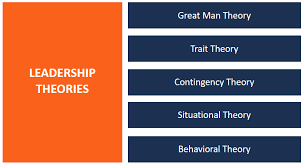
How people become leaders and what makes a great leader have been the subject of study for centuries. The 19th century was dominated by the Great Man Theory, which stressed that leadership is a unique, natural skill and that great leaders are born to the task.

The following are some of the many leadership theories advanced in the 20th century:
- Trait theory dates to the mid-20th century and it centers on the idea that some people are born with certain personality traits that make them great leaders, such as integrity and self-confidence.
- Situational leadership is where the leadership style is adjusted based on the readiness or skill-level of followers in a given situation.
- Contingency theory posits that effective leadership depends on having the right leader for the right situation.
- Transactional leadership is an approach where leaders reward or punish followers to achieve results.
- Transformational leadership is where leaders appeal to followers’ values and emotions to transform the way they think and approach their work or life.
- Behaviorist theory encompasses a person’s leadership skills are developed and trained as products of their environment.
- Behavioral theory is where a leader models certain behaviors, setting a good example for others to follow.
- Functional theory is leadership based on a collection of people’s behaviors and group dynamics, not individuals.
- Path goal theory is where leaders set goals and smooth the path to those goals to motivate and drive performance.


